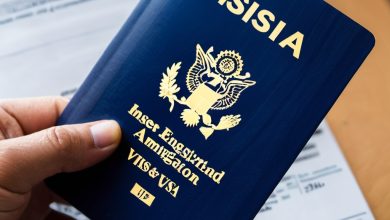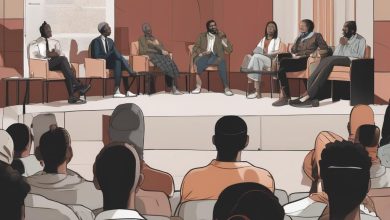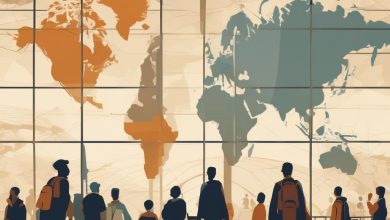Migration’s Effect on Family Dynamics

Migration’s Effect on Family Dynamics
Moving to a new country, whether by choice or force, changes families a lot. People and families face big challenges as they leave their old homes. They must adjust to new roles, relationships, and ways of connecting with their families over time.
This part looks at how migration changes family life. It talks about the hard times of being apart and together again. It also looks at how moving to a new place changes how families talk and connect across generations.
Key Takeaways
- Moving to a new country can deeply affect how families work and connect with each other, bringing both good and bad changes.
- Families may struggle with being apart and then coming back together, which can make relationships harder and require big changes.
- Changes in culture during a move can cause tension and change roles within families across generations.
- Handling new financial, work, and family duties can be emotionally and mentally tough for families moving to a new place.
- Having good ways to deal with stress and support is key for families to get past the challenges of moving and do well in their new home.
The Impact of Migration on Family Dynamics
Moving to a new place can deeply affect family life, bringing both good and bad changes. Families face the tough parts of being apart and together again. They must keep their strong family ties while adjusting to new cultures and changing relationships between generations.
Coping with Separation and Reunification
One big challenge for migrant families is being apart. When someone leaves for a new country, it can be very hard. They use technology to stay close, but coming back together can be hard too. They have to adjust to the changes that happened while apart.
Cultural Shifts and Intergenerational Dynamics
Adapting to a new place can lead to cultural clashes and strain on family ties. Younger ones might change faster, but older ones might hold on to old ways. This can cause misunderstandings and conflicts between generations.
To deal with these changes, talking openly and understanding each other is key. Families need to respect their roots but also welcome new changes and challenges.
| Challenges of Migration | Strategies for Adaptation |
| Family separation and reunification | Maintaining open communication, utilizing technology to stay connected |
| Cultural adaptation and intergenerational conflicts | Fostering understanding, finding a balance between traditional and new cultural practices |
| Evolving family roles and responsibilities | Discussing and renegotiating roles, sharing the burden of household and caregiving tasks |
Moving to a new place changes family life in many ways. Families must face emotional, cultural, and practical challenges. By understanding these challenges and finding ways to deal with them, migrant families can stay strong and do well in their new homes.
Emotional and Psychological Challenges
Moving to a new place can really take a toll on families. Being away from loved ones, facing new cultures, and the big changes can cause a lot of stress and mental health issues.
One big challenge is the emotional effect of being apart. Being away from family can make people feel sad and miss their loved ones a lot. Kids especially might feel anxious, depressed, or act out because they miss their parents or caregivers.
When families get back together after being apart, it can still be hard. They have to adjust to new ways of living together and reconnect. This can be a tough and sensitive time.
Moving to a new place also means dealing with cultural changes. These changes can lead to disagreements between generations and more stress in the family. It’s important for families to find ways to understand and accept these differences.
To handle these challenges, families need to use coping strategies and resources. Getting help from mental health experts, talking openly, and building a strong community can really help. These steps are key to making it through the tough times of migration.
| Challenge | Impact | Strategies |
| Separation from loved ones | Feelings of loss, longing, and anxiety | Maintain regular communication, seek support from mental health professionals |
| Reunification and adjusting to new family dynamics | Difficulty reestablishing connections and navigating changes | Engage in open communication, be patient and understanding |
| Cultural shifts and intergenerational conflicts | Tensions within the household, increased family stress | Embrace cultural diversity, find common ground, and compromise |
By understanding and tackling the emotional and psychological challenges of migration, families can better handle their experiences. This helps them build strength for the future.
Navigating New Roles and Responsibilities
When families move, their lives change a lot. People might take on new roles and duties, bringing both challenges and chances. They must adjust to new financial situations and balance work and family life.
Adjusting to Financial Changes
Moving can greatly change a family’s money situation. Families must adapt to new jobs, income, and living costs. They need to manage their money better, set priorities, and find ways to stay financially stable.
This can be hard because of language barriers and new financial systems. Families might need to learn new skills and get help from others.
Balancing Work and Family Life
Starting a new life in a different place can make it hard to balance work and family. Families have to juggle between earning money and taking care of their loved ones. They might look for flexible work options, childcare help, and ways to take care of themselves.
FAQ
How does migration affect family dynamics?
Migration can change family dynamics a lot. It often leads to challenges like being apart, coming back together, and changing culture. These changes can make it hard for families across generations to get along and change their roles and duties.
What are the difficulties families face when dealing with separation and reunification?
Families face many emotional and practical hurdles when they separate during migration. When they come back together, it can be hard and stressful. They have to work on rebuilding their relationships and adjusting to new ways of being a family.
How do cultural shifts affect intergenerational dynamics within migrant families?
Cultural differences between the old and new places can cause tension and confusion in families, especially between generations. Adjusting to these changes can be a big stress and cause conflict in migrant families.
What are the emotional and psychological impacts of migration on families?
Moving to a new place can be hard on families emotionally and mentally. It can lead to stress, anxiety, and even trauma. Things like being apart, cultural differences, and the big changes of moving can deeply affect the mental health of family members.
How do migrant families adapt to financial changes due to migration?
Moving often means big changes in money matters, like income, jobs, and living costs. Families have to deal with these financial changes. This can make family life and responsibilities even harder.
What strategies can migrant families use to balance work and family life?
For migrant families, balancing work and family life is tough. They often have new jobs, childcare tasks, and cultural expectations. It’s important to find good ways to handle these demands to keep the family strong.





